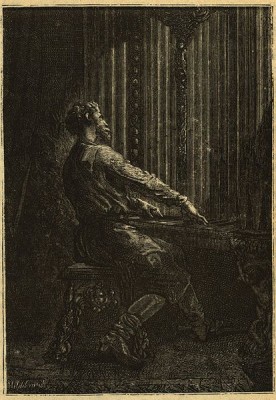
This week’s Trope Tuesday series post is by request from a reader.
Evil villains aren’t always grotesque, brutish, foaming-at-the-mouth barbarians. Quite often, they are wealthy and aristocratic, with exquisitely refined tastes and an extraordinary degree of eloquence. It isn’t just that evil is cool (though it may overlap with this), or that the barbarians have finally developed a fashion sense–it’s that the more refined and cultured a character is, the more evil they are as well.
This happens a lot more often than you might think. Magneto (X-men), Lucius Malfoy (Harry Potter), Hannibal Lector (Silence of the Lambs), Ganondorf (Zelda), Captain Nemo (20,000 Leagues Under the Sea), the Godfather (the Godfather), Kane (Command & Conquer), President Shinra (Final Fantasy VII), the Merovingian (The Matrix Reloaded), Grand Admiral Thrawn (Star Wars: Heir to the Empire and The Thrawn Trilogy), Khan (Star Trek II: The Wrath of Khan), Vetinari (Discworld), Captain Hook (Peter Pan), the Phantom (Phantom of the Opera) and every James Bond villain ever all fall squarely into this trope.
So why does this happen? I can think of a few reasons, though I’m sure there are others.
First, it hearkens back to the age-old romanticism vs. enlightenment debate. This is especially true of the fantasy genre, which tends to hearken back to a medieval golden age before the modern, industrial world, when life was simpler and people tended to live in picturesque rural villages instead of dense urban cities. If your hero is a farmboy in a world of knights and wizards, or a barbarian hero who strikes first and asks questions never, chances are that anyone with a sense of refinement or culture is going to find themselves on the wrong side of the story.
Second, it hearkens back to the mad scientist and the cautionary tale of science gone horribly wrong. As you might expect, this is much more common in science fiction, especially the classic dystopian stuff. The more scientific and enlightened a character, the more cultured they tend to be as well. In stories where science is bad, then, it should come as no surprise that these characters are also evil.
Another good reason to use this trope is to indicate that the villains are members of the Empire. Culture tends to happen when people of diverse talents and backgrounds are brought together, and the best way to bring them together is through conquest. Just look at the Romans. Almost every empire throughout history, no matter how brutal, has always produced an increase in some degree of culture. Even the Mongols gave way to Kublai Khan and the Silk Road. So in stories where the Evil Empire comes into play, having your villains be cultured can be a good way to show that.
The biggest reason for this trope, though, is that it makes the villains more complex and interesting. If being evil always meant living in a cave and eating raw meat, then every story would read like a badly written RPG, where the heroes keep grinding until all their stats are at 9999 or higher. And honestly, you have to admit that there’s something a little bit eerie about that guy who gets totally absorbed when playing the organ.
I haven’t played with this trope in a major way yet, but it does come into play a bit in Desert Stars, though only in a minor way. In Bringing Stella Home and Heart of the Nebula (forthcoming), Lars is pretty much the opposite of this (the Gentleman and a Scholar trope, though he did drop out of college). Probably the best example would be Heloise from Star Wanderers: Fidelity (Part II). She’s wealthy, fashionable, and decorates her apartment with wallscreen monitors that cycle through artistic photographs of deep space nebulae. She’s also one of the more dangerous female characters I think I’ve written. Who knows–maybe she’ll show up in another story before too long.
Very cool trope.